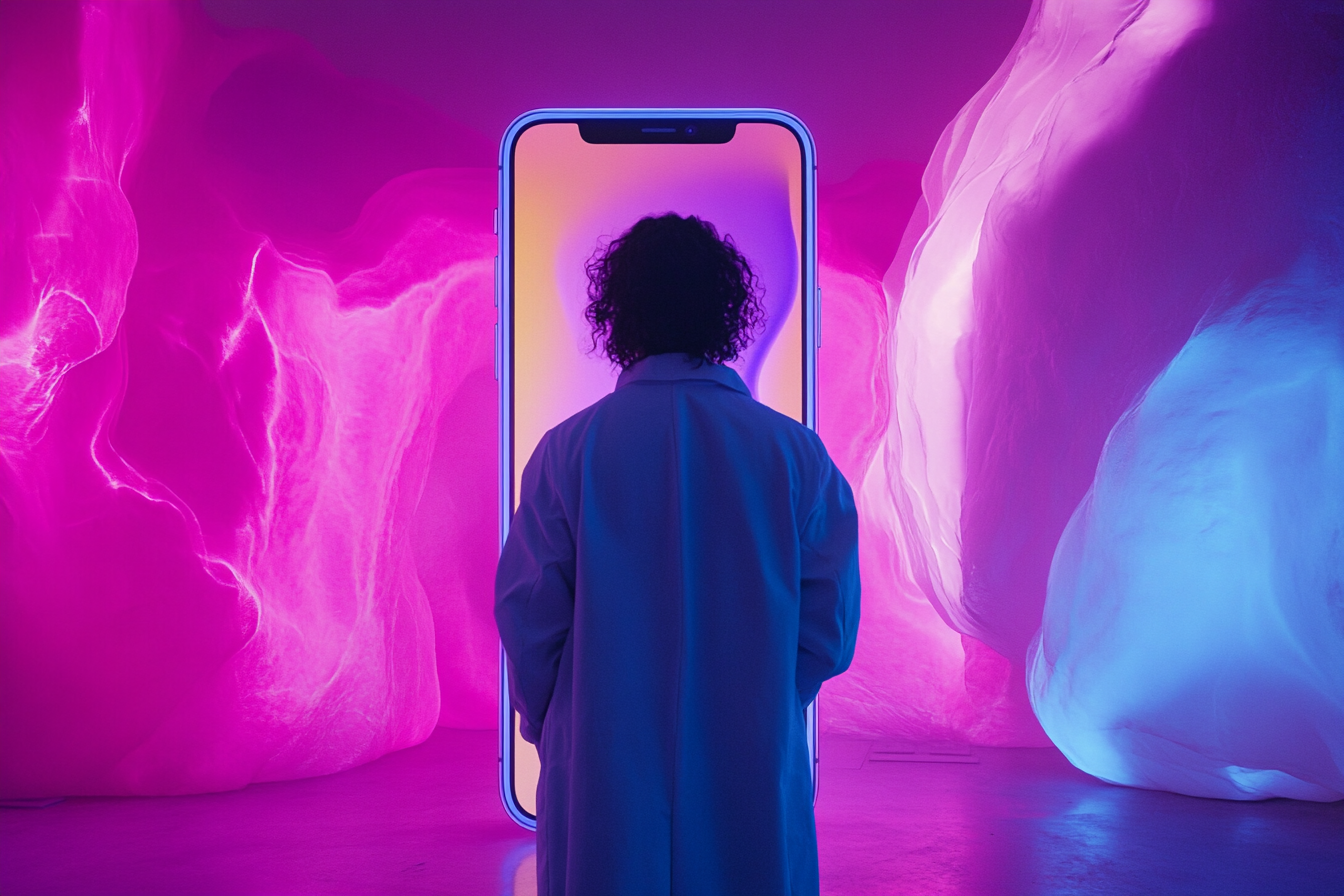
Over the past few days, there have been several huge waves of announcements made by major players in the artificial intelligence space. OpenAI and Google are the two loudest voices, but really, for the last couple of years, AI has been steadily increasing its footprint in the digital space.
And guess what? It’s time to start paying attention.
The changes happening now — fundamental shifts to web searching, image and video generation, spatial computing, and language model improvements — will impact your marketing in ways that you might not be aware of.
We aren’t talking about writing a page of content or creating lofi doctor art you can vibe to like this:

It’s more than that: AI is now undoubtedly something you need to be engaging with.
Next month, we will release a comprehensive series on artificial intelligence that will explain exactly what artificial intelligence is, what is available, how to use it, and, more importantly, how not to use it.
But for now, it is important that you are aware of the changes in the space and are preparing for their effects on your digital marketing program.
It’s also important to know what is really going on in the AI space so that when you hear from others that they have an “AI solution,” or they are “ultra AI-driven,” or how their “AI is on the bleeding edge of the industry,” you know that isn’t really the case.
As always, we are here to educate you on what is really happening, what will impact you today, and how you can capitalize on technological advancements to catch lightning in a bottle.
So, let’s break down the last week of updates.
1. Web Searches Are Going Through Big Changes
Google is revamping and reconstructing the way its users interact with search, and ChatGPT is becoming increasingly useful to its consumers. However, it hasn’t quite broken into your practice’s key phrases… yet.
Google Announces Fundamental Shift in Search Ecosystem
“Google will do the Googling for you.” — Liz Reid, Head of Search at Google.
This statement alone strikes fear into the hearts of even the toughest SEOs. Why? It confirms what they have been concerned about for a long time: that AI would be responsible for a major decline in user traffic.
Google has been testing a new feature known as AI Overviews for a while now. (It used to be called Search Generative Experience.) Yesterday, they announced that AI Overview is not only the new branding but that the feature will go live sometime today.
AI Overviews use artificial intelligence to curate a response for Google searchers, pulling data from top and relevant websites and compiling the information.
Here is an example of what AI Overview looks like:

According to our own Undisputed Heavyweight SEO Champ, Luke Miller, we are already experiencing some of the adverse effects of AI Overviews:

Essentially, we are facing this dilemma: Why would Google users bother to go to websites when Google will be extracting information from these websites and presenting it to the user themselves?
Not to mention, with Google’s recent announcement on “multi-step reasoning,” a system that would allow its AI tool to answer numerous questions at once, it is possible that total search volume will drop in general.
(You can find the full list of new search features here.)
Our upcoming series will break this down in even greater detail, but for now, what you need to know is that big changes are on the horizon for search engines that you need to prepare for, whether we like it or not.
Here is the most important tip we can give you, though: now, more than ever, you need to be providing insightful, unique, and strategic content to your audience if you hope to have any kind of fighting chance on search engines.
ChatGPT Could Start Winning Search Queries, But Not Local Searches

As OpenAI continues to develop its flagship product, ChatGPT, it becomes increasingly more useful to the average consumer as an alternative to web searching. Now that ChatGPT can scour the internet at large, it is also perfectly capable of curating information for a user in the same ways that Google AI can.
But what does this mean for your marketing? Should you start worrying about optimizing for ChatGPT?

Thanks for the reassurance, People’s Champ.
2. Image and Video Generation Are Making Big Strides

Video generated by OpenAI’s Sora.
Art diffusion models have been around for just as long as language models, generally speaking. But both Google and OpenAI have reaffirmed their focus on omni-capable models. (That is, artificial intelligence that can process and learn from text, image, audio, and video.)

Image generators have only gotten more sophisticated since their launch, but with the inclusion of video generation AI, it’s starting to look like a whole new world will open soon for content creators and marketers.
Here is an example of Sora, OpenAI’s video generation model announced a few months ago:
And here is a promotional video that Google put out yesterday about Veo, their text-to-video model:
These models may or may not be having a substantial impact on your marketing now, but soon, they may be the new place you turn to when you find yourself in need of stock imagery or footage — specifically, any assets that are tailored to your practice or really niche snippets of content.
We will cover image diffusion models in greater depth in the article series next month, but it is worth taking a look at this video on Google’s Imagen 3 to get an idea of what the lay of the land is now:
(Music generation is also on the horizon. “Lyria,” Google’s AI music generator, was announced, and there are a few other players in this space, but music generation as of now isn’t something that is too high of an impact on your marketing program.)


3. Spatial Computing Is Becoming More Prevalent
This is a big one, but the truth is, we are still probably a little ways away before this becomes a concept you need to dive too far into for your marketing. Nevertheless, let’s make sure you are prepared for the future that is to come: spatial computing is going to cause a massive shift in how we interact with the world around us.
And that includes your medical aesthetics practice.
There are three big hitters in the recent spatial computing ecosystem: Project Astra from Google, GPT 4o from OpenAI, and Vision Pro from Apple.
Vision Pro is Apple’s insanely overpriced product that changes the world around you in real-time. At first glance, it might seem similar to Project Astra and GPT 4o, but it isn’t. Vision Pro has none of the AI elements that make the other two so groundbreaking.
Project Astra and GPT 4o are causing such a stir because of their AI’s ability to process and reason with the video they are being presented. While it might seem like the practical application of this kind of technology is close to zero for your practice, you shouldn’t ignore its existence.
Why? Because, eventually, it will be relevant.
When it does become part of the general public’s digital toolbox, you’ll need to know exactly what it is and how to best use it if you want to stay on the bleeding edge of the industry. At some point — maybe not too far in the future — optimizing your practice for the web might include making sure you are spatial computing-ready.

4. Language Models Are Becoming Much More Robust
GPT 4o has a 128,00 token context window, which is about the same as 96,000 words. This means you can have 96,000 words of conversation with ChatGPT’s newest model before it starts “forgetting” the information you provide it.
Now, 96,000 words are nothing to scoff at, but Google announced yesterday that Gemini’s token context window would be 2 million tokens or roughly 1.5 million words. Gemini has just vastly improved the available tools for professionals looking to sift through huge amounts of data, information, or content.
Why Are These Changes Being Made?
At the end of the day, Google is a business. The big changes that are coming to web and search are happening because Google believes it is the most lucrative path forward. If they continue to define the way people use the internet to look for information, then they can continue to serve up an incredibly bloated front page of Google, as we mentioned before — even if it is at the cost of content producers.
Ultimately, all artificial intelligence platforms are doing whatever they can to make their service the most usable, intuitive, and mainstream version of the technology so that it can one day be successfully monetized. That doesn’t mean they aren’t tools worth using or that a symbiotic relationship is impossible, but it is important to understand the underlying motivations so that you understand the dynamic you are entering.
Closing Thoughts on AI Use
When we launch the series next month, we will provide much more guidance on how you should and should not be using AI right now at your practice. But, until then, we still wanted to give you some general guidance. So here is some information from Tim Jacobs, Incredible’s Director of Technology:

We know, we know… it’s easy to make another Terminator or Skynet joke and shrug it off for as long as humanly possible… but we are telling you — imploring you even — just don’t.
You don’t have a decade before AI becomes mainstream… It is mainstream now. And even if you aren’t willing to dive in, your competitors will be, and they will be even happier that you didn’t.
Keep an eye out for our detailed AI series and guides, which are coming soon. And, yeah, we have to admit, they are pretty incredible.










